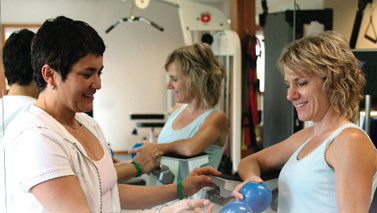Expert Source: Jessie Gruman, PhD, author of AfterShock: What to Do When the Doctor Gives You—Or Someone You Love—A Devastating Diagnosis, and president of the Center for Advancing Health in Washington, D.C.
It’s a nightmare scenario. The doctor determines that you or a loved one has a life-altering condition — something that is going to call on your deepest resources of strength to handle. A bad diagnosis can land like a bomb, frightening and disorienting you in a way that little else can.
Jessie Gruman has interviewed hundreds of people who have dealt with serious diagnoses, and she has survived four cancer scares herself. She asserts that even though a scary diagnosis can turn your world upside down, there are practical strategies you can use to take the best next steps and bring balance back to your life.
Barriers to Overcome
- Sense of chaos. “When you get a serious diagnosis,” says Gruman, “you’re likely to feel that the world is spinning out of control. You don’t know the meaning of what’s going on, or what’s going to happen next. You feel totally unmoored.”
- Runaway fears. Your imagination will kick into high gear, says Gruman, and fill in all the unknowns by finding worst-case scenarios and dwelling on them. When you revisit those scenes over and over in your head, they begin to seem like reality.
- Feelings of urgency. It’s natural to feel impatient when you get a devastating diagnosis, says Gruman. “You tell yourself, ‘I have to get this cut out right away,’ or ‘I have to get on the right meds today.’ Super-urgency can be a way to distract yourself and channel your anxiety. It can also lead you to hasty and potentially unwise decisions about treatment and how to move forward.”
- Replaying the past. You may dwell on how past behaviors contributed to the disease, causing a cascade of anxiety and self-recrimination.
Strategies for Success
- Remember that your feelings will improve. In the immediate aftermath of a diagnosis, the anxiety and fear can feel destabilizing and permanent. But those emotions are important reminders that your body and mind are mobilizing to protect you, says Gruman. And their intensity will subside over the coming days. “You will still have plenty of challenges, but the intensity of the confusion and fear will lessen naturally.”
- Slow down. Fight the urge to make major decisions right away, says Gruman. Taking a few days or a week to do some research and get a second opinion can make all the difference in finding the best doctors and treatment for yourself.
- Seek comforts, new and old. Making healthy lifestyle changes and exploring new modes of self-care can provide crucial comfort and support. But don’t abandon all your old routines either, says Gruman. If nature walks have always buoyed your spirits, walk. If you like to get lost in a book, read. “This isn’t the time to say no to familiar pleasures.”
- Choose whom to tell. Support from friends is absolutely essential, says Gruman. “But you get to decide with whom to share it. A friend who is going to cry or freak out every time he or she talks to you is not going to be helpful.”
- Use the Web wisely. “It’s important to remember how wildly inaccurate online information can be and to be conservative in your search, especially at the beginning,” says Gruman. Indiscriminate Web surfing may increase fear more than impart knowledge. “Talk with trusted health professionals and savvy friends instead, and reference the Web judiciously.”
This article originally appeared as “When Your Doctor Says, “I Have Bad News”” in the November 2012 issue of Experience Life.




This Post Has 0 Comments